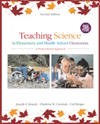

 Teaching Children Science: A Project-Based Approach, 2/e How Do I Plan a Project-Based Curriculum? Case-Based Questions |
 2003 McGraw-Hill Higher Education
2003 McGraw-Hill Higher EducationAny use is subject to the Terms of Use and Privacy Policy.
McGraw-Hill Higher Education is one of the many fine businesses of The McGraw-Hill Companies.